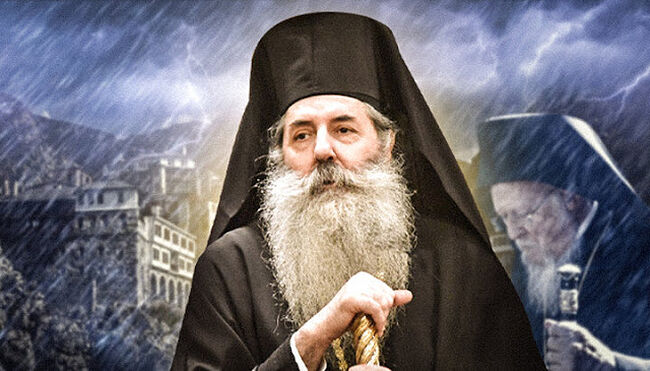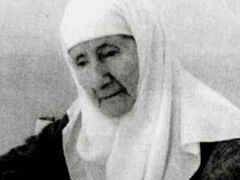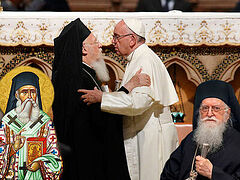Piraeus, Greece, November 8, 2023
A new statement from the Office of Heresies and Sects of the Greek Orthodox Church’s Metropolis of Piraeus warns of the influence of ecumenism and the Church and its effect on the canonization process.
“We observe that in recent decades, an increasingly dangerous foreign ecumenical spirit is infiltrating the Orthodox space, adopting different criteria for canonization,” the statement reads, reports Vima Orthodoxias.
The statement comes in the wake of the recent canonization of Mother Gavrilia, “the ascetic of love,” by the Patriarchate of Constantinople, which proved controversial among many Greek Orthodox faithful.
“This was natural and expected because, in our humble opinion, there is a plethora of evidence indicating that the blessed nun was a person influenced by ecumenical positions,” the Office states, noting that the only source on her life, written by a disciple who later apostatized according to the Piraeus Office, presents her as a proponent of ecumenism (the Metropolis had already voiced its concern about her in an article from 2018).
However, the Metropolis goes on to note that “reliable sources” have confirmed that the book, The Ascetic of Love, presents a very distorted picture of Mother Gavrilia. But this raises the question of what sources the Patriarchate relied on for her canonization then. The Metropolis has formally requested this information and is awaiting a response.
The Office of Heresies and Sects considers it necessary to emphasize, in our days dominated by the demonic spirit of ecumenism, that moralism is not a criterion for canonization. Rather, saints worthy of canonization are those who have been completely transformed by the grace of God.
Some Fathers, such as St. Maximus the Confessor, even go so far as to say that man becomes “uncreated” by grace. Thus, “sanctification transforms his nature, not simply ‘improving’ his character,” the Office writes.
Thus, the Office believes, it is a mistake to canonize those who simply had a degree of asceticism, a spiritual life, who were active in philanthropic work, and certainly those who were tainted by ecumenism.
Further, the spiritual condition of those who decide on someone’s sanctity and propose them for canonization is also important, the Metropolis writes. As Fr. George Metallinos wrote, “Only the saints know who is a saint.”
The statement then poses a rhetorical question:
At this point, we do not consider it unnecessary to pose the following burning questions, which can only be considered rhetorical since the answer is self-evident: Can individuals who not only lack basic spirituality but have also been corroded by ecumenical ideology ever decide on the sanctity of person A or person B? Is it possible for individuals whose minds have been clouded by heresy to be considered competent and suitable to make decisions about the canonization of the faithful?
And further:
We emphasize that the prevailing “atmosphere” of religious syncretism has infiltrated the Orthodox space, dangerously diluting the teaching of the Church on holiness and undermining the prerequisites for the canonization of new saints in the Holy Spirit. Our reservations intensify when we observe that contemporary well-known figures of holiness (with miracles as witnesses), such as St. Philotheos Zervakos with his fragrant relics, have been “forgotten” and are not proposed for canonization, presumably because they had fought against the pan-heresy of Ecumenism and the general decline of ecclesiastical institutions and individuals.
Conversely, “sympathetic” elders and eldresses who were silent in the face of ecumenism are being proposed for canonization, the Metropolis laments.
Follow OrthoChristian on Twitter, Vkontakte, Telegram, WhatsApp, MeWe, and Gab!




